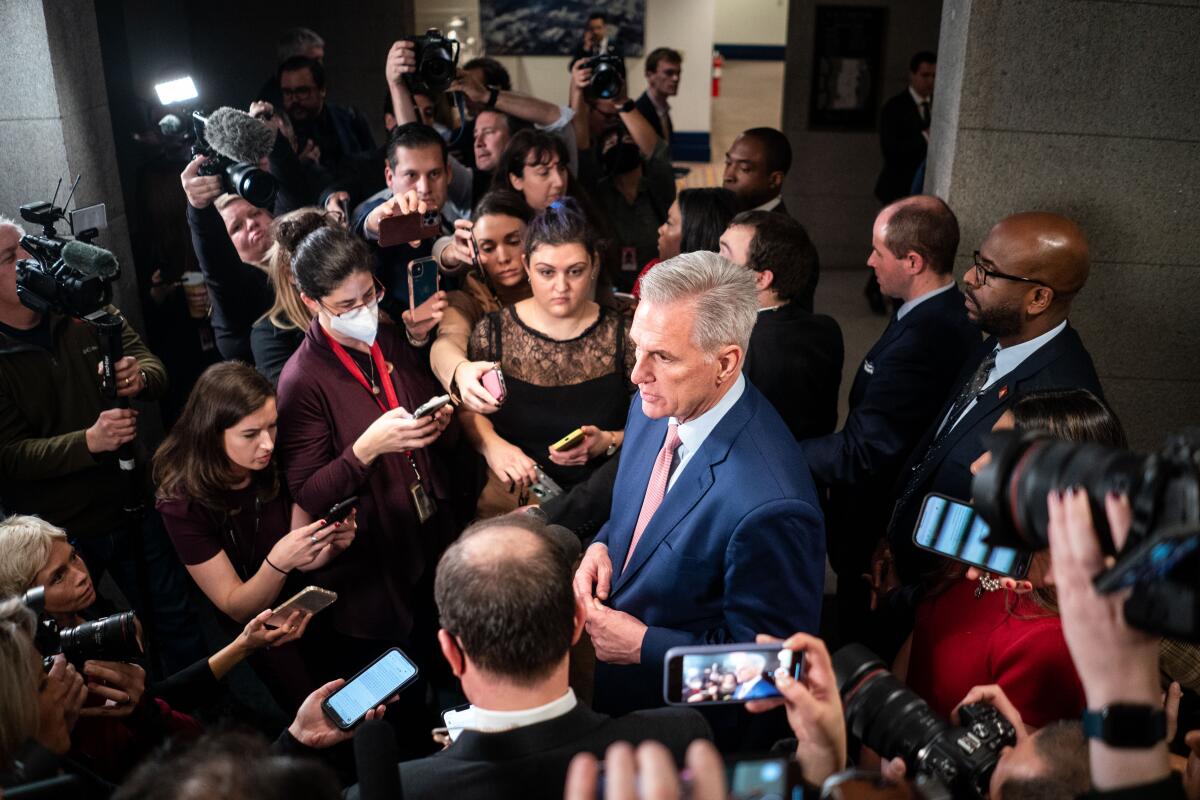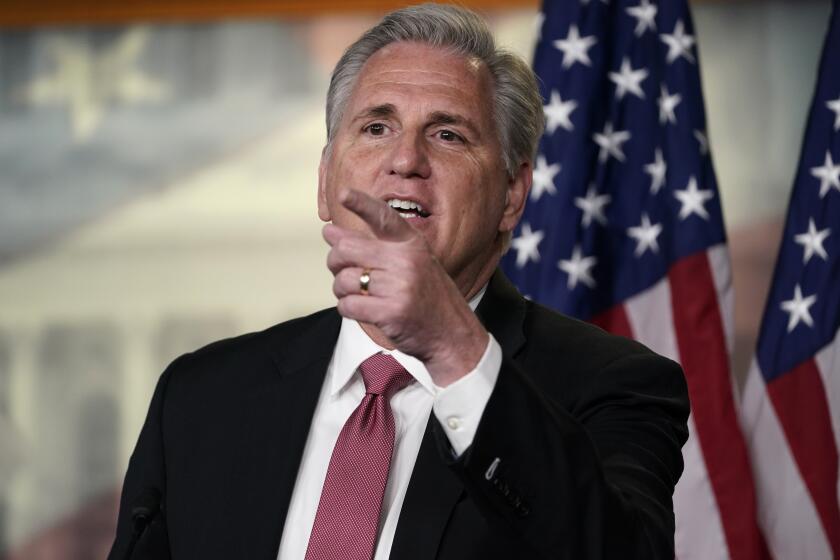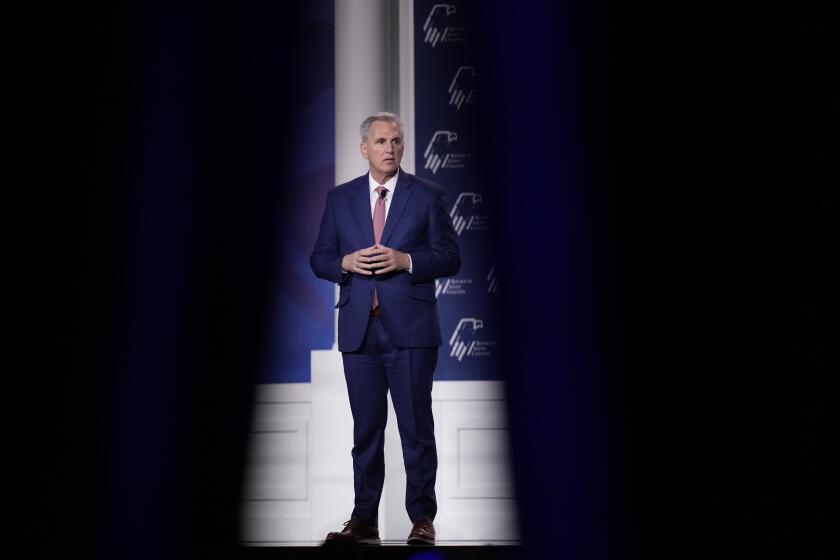Kevin McCarthy falls short on first three votes for speaker in historic defeat

- Share via
WASHINGTON — Rep. Kevin McCarthy failed three times to secure a majority of votes to succeed Nancy Pelosi as speaker of the House on Tuesday before the chamber adjourned with the outcome of the leadership contest still in doubt.
The motion to adjourn was adopted with little opposition Tuesday afternoon following hours of roll call votes that failed to elect a speaker.
McCarthy (R-Bakersfield) became the first majority party leader in a century to fail to secure the speakership on the first ballot. He attracted zero additional votes on a second ballot and lost support on the third ballot, as Rep. Byron Donalds (R-Fla.) switched his vote from McCarthy to Rep. Jim Jordan (R-Ohio).
“The reality is Rep. Kevin McCarthy doesn’t have the votes,” Donalds tweeted after the vote concluded. “I committed my support to him publicly and for two votes on the House Floor. 218 is the number, and currently, no one is there. Our conference needs to recess and huddle and find someone or work out the next steps.”
Republicans appeared to take Donalds’ advice, as the chamber moved to adjourn until Wednesday at noon. McCarthy, however, huddled in the speaker’s office, where reporters spotted pizzas being delivered, signaling that it would be a long night for the GOP leader.
House Republicans plan to meet in private Wednesday morning ahead of a fourth round of voting.
The repeated failure to elect a speaker is a clear sign of the divisions in the Republican Party. It is also a potential blow to California. If McCarthy prevails, Congress will hand off power and influence from a California Democrat — Pelosi — to a California Republican. If he doesn’t, both leaders could be relegated to the back benches — one by choice and the other by force.
Nineteen Republicans voted for candidates other than McCarthy on the first and second ballots. Twenty Republicans voted for Jordan on the third ballot, leaving McCarthy 16 short of the 218 votes needed to secure the post he has long sought.
Although Tuesday’s first-round outcome wasn’t a surprise, the fact that McCarthy and his allies were not only unable to move votes his way but also lost ground on a subsequent ballot was startling — and potentially fatal to his diminishing path to the speakership.
A small number of right-flank Republicans had for weeks vowed to oppose McCarthy on the floor when the new Congress convened, even as he continued to negotiate with members and make concessions on rule changes. That figure ballooned to 20 by the third roll call. How the weeks-long stalemate between the majority of the House Republican Conference and the growing pocket of GOP antagonists will be resolved remains unclear.
The House speaker election hasn’t required multiple ballots in a floor vote since 1923, when Rep. Frederick Gillett (R-Mass.) was elected on the ninth ballot. According to the House historian, every speaker election that went more than three rounds lasted at least nine, with one going to 133 ballots in the mid-1800s.
Rep. Steve Scalise’s (R-La.) nomination did nothing to improve McCarthy’s vote totals in the third round. Nor did Jordan’s speech nominating McCarthy in the second round, despite the staunch support the Ohioan has won from the party’s right wing as a co-founder of the ultraconservative House Freedom Caucus.
“I think Kevin McCarthy’s the right guy to lead us. I really do, or I wouldn’t be standing up here giving this speech,” Jordan pleaded to colleagues in his nominating remarks.
“Kevin told me the toughest times in life are when you get knocked down. The question is can you come back. And I’ve always seen him be able to do that,” he said.
It’s not clear, however, that McCarthy can come back from three failed roll call votes. Shortly after Jordan nominated McCarthy, Rep. Matt Gaetz (R-Fla.), sitting just steps away from McCarthy, rose to nominate Jordan instead.
Rebellious Republicans who had voted for alternatives in the first round of balloting voted in unison the second time around for Jordan, who also picked up Donalds’ support in the third round.
The Bakersfield congressman’s ideological flexibility, fundraising prowess and management of Donald Trump have helped him hold House Republicans together as they head into the midterm elections. Now he’s on the verge of gaining the prize he has long desired.
At noon, when the 118th Congress formally convened, officials were seen removing the metal detectors that Pelosi (D-San Francisco) had installed outside the floor in the aftermath of the Jan. 6, 2021, attack on the Capitol. But by the time the House adjourned after 5 p.m., the chamber still lacked new leadership.
The House’s failure to elect a speaker on the first three ballots throws into chaos the beginning of a divided government in Washington, delaying the swearing-in of members of the House, GOP committee assignments and votes on the rules that will govern the new Congress.
California Republican Kevin McCarthy stands to be House speaker if his party regains control of the chamber. What drives the Bakersfield politician?
The splits within the GOP were evident even before the first roll was called. Gaetz and Reps. Bob Good (R-Va.) and Andy Biggs (R-Ariz.) remained seated as most Republicans stood and applauded Rep. Elise Stefanik’s (R-N.Y.) initial nominating speech for McCarthy.
Democrats, in contrast, were in complete unity as Rep. Pete Aguilar (D-Redlands) stood to nominate Rep. Hakeem Jeffries (D-N.Y.), who has little chance of becoming speaker in a House Republican majority. Rep. Paul Gosar (R-Ariz.) later nominated Biggs for speaker, to muted applause in the chamber.
On the other side of the Capitol, Senate Minority Leader Mitch McConnell (R-Ky.) celebrated a historic feat of his own, delivering floor remarks to commemorate his new record as the longest-serving leader in the upper chamber.
Although Republicans lost the White House in 2020, the Senate in 2021 and a Senate seat in the 2022 midterms, McCarthy guided House Republicans to gains in the 2020 and 2022 cycles. He traveled the country raising huge sums of money and tying himself closely to former President Trump.
Trump has so far proved unable to persuade rebellious GOP members of the House to back McCarthy for speaker, a powerful post that would put the man he once called “My Kevin” second in line to the presidency behind Vice President Kamala Harris.
In a brief phone interview with NBC News, the former president declined to say whether he still supports McCarthy for speaker.
“We’ll see what happens,” Trump said. “We’ll see how it all works out.”
In a post to his social media platform, Truth Social, Trump lamented that there is “so much unnecessary turmoil in the Republican Party” but made no mention of what transpired on the House floor. Instead, he blamed McConnell; former Transportation Secretary Elaine Chao, who is McConnell’s wife; “and their RINO allies,” an acronym for Republicans In Name Only.
House GOP candidates fell far short of expectations last cycle, leaving the party with a narrow 222-212 majority over Democrats until the late Rep. Donald McEachin (D-Va.) is replaced in a special election later this year, probably by the Democratic nominee. And Democratic leaders are already bullish on their prospects for taking back control of the chamber in the 2024 elections.
McCarthy handily won an internal House Republican Conference vote for speaker in November against Biggs, 188 to 31.
The full GOP leadership slate elected in November included Reps. Scalise as majority leader, Tom Emmer (R-Minn.) as majority whip, Stefanik as conference chair and Richard Hudson (R-N.C.) as chair of House Republicans’ campaign arm, the National Republican Congressional Committee.
Only the speaker’s post requires a full vote of the House, during which the winning candidate must receive the backing of a majority of all members present and voting.
If McCarthy can’t secure enough votes, it’s not clear who could, though some Republican members have floated the possibility of working with Democrats to elect a moderate speaker.
The chaos on the House floor only feeds into Democrats’ narrative that House Republicans are incapable of governing.
After the House chaplain’s prayer — and before the roll call votes for speaker commenced — reporters seated above the House floor in the gallery heard Rep. Juan Vargas (D-San Diego) say, “Let the show begin.” And during his vote, Rep. Ruben Gallego (D-Ariz.) cast his vote for the “current vote leader,” Jeffries.
“The 118th Congress has yet to begin and Americans are already seeing how dysfunctional and disastrous GOP control of the House is going to be,” Rep. Suzan DelBene (D-Wash.), chair of the the Democratic Congressional Campaign Committee — House Democrats’ campaign arm — said in a statement.
“While House Republicans fight one another in unprecedented ways, and Kevin McCarthy gives [in to] the most extreme flanks of the Republican party in desperate plays for their support, Democrats are clear-minded, unified and eager to get to work for the American people.”
California Rep. Kevin McCarthy has no business in Congress’ highest office or the presidential line of succession.
More to Read
Get the L.A. Times Politics newsletter
Deeply reported insights into legislation, politics and policy from Sacramento, Washington and beyond. In your inbox twice per week.
You may occasionally receive promotional content from the Los Angeles Times.














